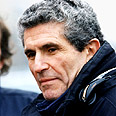
“Cinema is omnipresent in my life," says Claude Lelouch. "It drives my motivation, my thoughts and my past. It is like oxygen in the blood to me.”
Now, after 50 years in the film industry, Lelouch has published a retrospective of a life marked by memories of a childhood under the occupation
Everything the director does must one day become a film, he says.Cinema is his life and his life is his cinema.
Private viewing with commentary
In the book, which is written in the form of an interview, Lelouch for the first time talks about his whole oeuvre. Filled with anecdotes and lavishly illustrated, the book is like a private viewing with live commentaries by the director.
The authors Yves Alion and Jean Olle-Laprune chose to interview the director about his films, his success, his failures, his childhood memories and God.
Memories as a theme
During the war the Lelouch family left Paris for the south of France just one week before Nazi invasion.
“My father was a shopkeeper but he was very sharp. He suspected that the Jews would be exterminated,” Lelouch told the monthly “Tribune Juive."
“Every time someone knocked at the door I hid in a cupboard. I had a list of phone numbers stuffed under my belt in case of emergency. Still today, I’m psychologically scarred by this. I never really let go, except when I’m in love.”
In order to hide him from the Nazis, his mother confided him to an usherette in a local cinema. “I spent my time in the cinema and I developed a passion. Cinema is the best vehicle to go from barbarity to civilisation.”
“Cinema made me aware of the world. It made me love life. It is my mother and my father in one.”
The war period has strongly influenced his films. “It is important for me to explore this theme that dominated my childhood,” he explains.
In “Les uns et les autres” and “Le miserable” the children escape Nazi persecution just as he did.
“During the war a German officer asked me to drop my trousers. I told him I was circumcised because I peed sideways. I recited a Catholic prayer, which saved my life.”
Happy to be Jewish
As a boy, Lelouch was torn between his observant Jewish father and his mother, who had converted to Judaism for her husband’s sake but still went to church.
“My parents argued a lot about this,” he comments. “During the occupation, a parish priest took me under his wing and made me a choir boy. So I grew up in a contradictory world, which left me confused about my faith and my Jewishness.”
For Lelouch the Jew is always in transit. “He isn’t at home anywhere. He is a nomad who is constantly on his guard. The Jew doesn’t have time to be happy. He is constantly struggling with suspicion and mistrust.”
“Today I believe in God. My faith was sparked when I made a film in Israel. Over there, it is impossible not to believe in God. I loved the places of worship of all the religions.”
“Everything which happens is for the best. I sometimes have the feeling that my inspiration comes from heaven. I think it is wonderful to be Jewish.”
“Claude Lelouch: mode d’emploi” by Yves Alion and Jean Olle-Laprune is published by Editions Calmann-Levy















